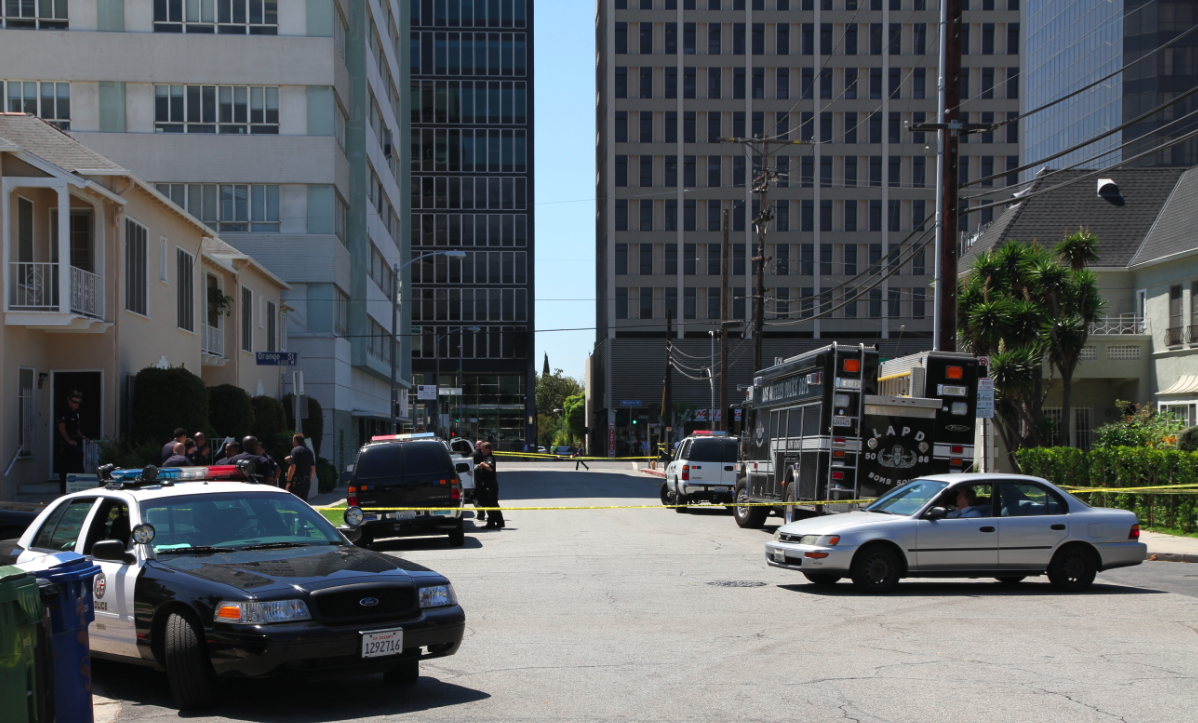9 minute read
Building Better States? State Authority, Moral Responsibility, and Reparations
By Jennifer Page
 “Los Angeles Downtown” by Aydin Palabiyikoglu. Used under: https://creativecommons.org/licenses/by-nc/2.0/
“Los Angeles Downtown” by Aydin Palabiyikoglu. Used under: https://creativecommons.org/licenses/by-nc/2.0/
In 1981, “Mary M.” was pulled over for drunk driving by on-duty Los Angeles Police Department officer Leigh Schroyer. Schroyer drove Mary M. home, forced his way into her house, and raped her. Mary M. suffered greatly during the attack and in its aftermath, and underwent psychological counseling for trauma.
The Mary M. case raises questions about the state’s moral responsibility for official wrongdoing. Is it just the abusive police officer who is morally responsible, or is the city of Los Angeles responsible as well? Who owes redress to the victims? If Los Angeles owes redress, is this a case of no-fault vicarious liability, or is the city in some sense blameworthy?
On Larry May’s model, Los Angeles does not bear moral responsibility for Schroyer’s act of sexual assault.[1] May’s model contains an authority condition and a control condition, and both are necessary for state responsibility for official wrongdoing to obtain. Since Schroyer employed the authority granted to him by the city, the authority condition is satisfied. However, nowhere in the court records of the Mary M. case is it suggested that other police department officials could have foreseen that Schroyer was prone to sexual abuse based on his hiring records or history as an officer in the department, nor was there a culture of sexually abusive behavior within the LAPD. The control condition is not met; hence Los Angeles is not responsible.
“…the state is implicated even when a lone official uses state authority in the commission of wrongdoing“
Contra May, however, my claim is that fulfilling the authority condition is sufficient for the state’s moral responsibility. The control condition does not have to be satisfied. The core of my argument has to do with official roles. The state can only act through its officials, and benefits greatly from an arrangement where officials are delegated authority which they wield on the state’s behalf. Thus the state is implicated even when a lone official uses state authority in the commission of wrongdoing.
To this, one might reasonably object that when officials use state authority in ways consonant with state policies, they are acting as officials, but when they abuse this authority, they act as individuals only. However, if this line of reasoning is correct, we should view officials solely in their individual capacity when they go above and beyond the call of official duty. We tend not to do this. It is typical for news headlines reporting on a heroic deed to refer to individuals by their roles rather than their names, e.g., “Two sanitation workers save toddlers, avert tragedy” and “Kind hearted police officer praised for helping injured sheep.” Cities and departments are quick to affirm a heroic official as their heroic official. “Our own local hero, Michael Adams, talks to NBC LA about the rescue of #JesseHernandez from the complicated network of LA’s sewer pipes last month,” reads a Facebook post by the Los Angeles Sanitation & Environment department, linking to a video. If state entities are willing to share some of the recognition when an on-duty official goes beyond the call of duty, they should also be willing to accept some of the blame when an on-duty official acts wrongfully.
 “LAPD” by Joris Debeij. Used under: https://creativecommons.org/licenses/by/2.0/
“LAPD” by Joris Debeij. Used under: https://creativecommons.org/licenses/by/2.0/
Indeed, ruling against the city of Los Angeles, the California Supreme Court held that Schroyer’s employing state authority was a central element of his act of rape:
Sergeant Schroyer detained plaintiff when he was on duty, in uniform, and armed. He accomplished the detention by activating the red lights on his patrol car. Taking advantage of his authority and control as a law enforcement officer, he ordered plaintiff into his car and transported her to her home, where he threw her on a couch. When plaintiff screamed, Sergeant Schroyer again resorted to his authority and control as a police officer by threatening to take her to jail…. Our society has entrusted police officers with enforcing its laws and ensuring the safety of the lives and property of its members. In carrying out these important responsibilities, the police act with the authority of the state.[2]
In allocating blame, it is reasonable for someone raped by a police officer to be conscious of that individual’s institutional role. It is reasonable for a person like Mary M. to want to hold Los Angeles accountable for how the authority entrusted to its police officers was used. That she was sexually assaulted by an on-duty Los Angeles Police Department officer, and not just a random individual, is a descriptively and normatively significant aspect of Mary M.’s ordeal. Any plausible account of state responsibility for official wrongdoing should recognize this.
“If state entities are willing to share some of the recognition when an on-duty official goes beyond the call of duty, they should also be willing to accept some of the blame when an on-duty official acts wrongfully.“
Of course, an official whose conduct was wrongful is morally responsible as well, and should be liable to civil damages and criminal punishment as appropriate. But moral responsibility is not zero sum, and means different things in the context of the transgressive official and the context of the state. In the Mary M. case, Schroyer is morally responsible for the sexual assault, and more blameworthy than Los Angeles, which is only responsible for the fact that state authority was used in an abusive and harmful way.
From Responsibility to Reparations
In Building Better Beings: A Theory of Moral Responsibility, Manuel Vargas argues that the social practice of holding people responsible through the mechanisms of praise and blame makes us humans morally better. Knowing one’s actions are subject to praise and blame encourages people to consider and act on moral considerations, and promotes moral agency.
But as Vargas argues, blaming can be burdensome for those who do it, even when deserved. Vargas’s primary example of this is the heated legal battle following the Exxon Valdez oil spill and its emotional and mental health impact on Alaskans. “Individual moral outrage and ongoing participation in blaming practices directed at such institutions and organizations, sustained without a willingness to forgive, may come at tremendous cost,” writes Vargas.[3] Here Vargas’s position, in line with May’s and many theorists of corporate agency, is that institutions and organizations are properly subject to ascriptions of moral responsibility; they can be praised and blamed just like human moral agents. But when institutions or persons act wrongfully, blaming is not always worth it. Vargas’s question becomes: how do we foster moral agency through our responsibility practices in spite of the personal costliness of these practices?
 “Exxon Valdez Oil Spill – 0068” by ARLIS Reference. Used under: https://creativecommons.org/licenses/by-sa/2.0/
“Exxon Valdez Oil Spill – 0068” by ARLIS Reference. Used under: https://creativecommons.org/licenses/by-sa/2.0/
For Mary M., pushing the city of Los Angeles to take responsibility for Schroyer’s act of rape did come at a great personal cost. She sued the city, which defended itself on the grounds that Schroyer was responsible in his individual capacity only. Flora Trostler, the attorney for the city, said that Mary M. connected the emotional issues she’d been having to the rape for “economic gain” from Los Angeles, a deep-pocketed defendant.[4] If Schroyer was to blame for the rape, Mary M. was to blame for what happened in the rape’s aftermath, argued Trostler: “She sat there and let herself gain weight, let herself continue to drink, let herself continue to be a sloppy housekeeper, let herself engage in a not-so-healthy sex life…. She let herself drown in her own sorrows when she had a duty to take care of herself.”[5]
This victim-blaming language is obviously off-putting, but in the context of litigation, contesting one’s blameworthiness is incredibly common—the near-default response to being sued. The role of attorneys is to defend their clients to the utmost. However, from a moral point of view, one acts wrongly in deflecting blame if it is deserved. Thus moral duties and legal entitlements can come into conflict. Should moral duties be prioritized?
In private life, individuals prioritize moral duties to their legal entitlements all the time. If I were to carelessly break a friend’s possession, I would be more concerned about rectifying her loss and making sure our relationship does not suffer than trying to minimize what I owe her. I could refuse to pay and give excuses. To recoup the value of the item, my friend would need to bring me to court, where my lawyer would formalize my excuses into a legal defense. But I would not do this.
Though sometimes individuals forgo their entitlement to a legal defense and are willing to pay compensation without a judge’s intervention, this does not mean that a society should operate without civil courts. It is not always to be expected that individuals will be able to settle conflicts on their own. A legal process where a plaintiff can put forward a complaint and a defendant can offer a defense should always be available as an option. In the course of a legal process, some blameworthy defendants will inevitably respond with legally acceptable but morally invalid claims. But this is a bullet well worth biting, at least insofar as private defendants are concerned. This includes Exxon. As morally reprehensible as some might find it for a large, powerful corporation to strategize to minimize its liability for an accident like Exxon Valdez, this does not mean that it should not have the legal right to do so.
States are different, however. Unlike private parties like individuals and firms, a state is not supposed to have self-interested motives. Its interest is the public interest, the interest of its political subjects. In responding to Mary M., the city of Los Angeles should not act as though it were a private party, treating the plaintiff as an adversary, but ought to voluntarily accept moral responsibility. In practice, this means settling a lawsuit that has been initiated in a way that favors the citizen-plaintiff—or better, offering an apology and reparations before a lawsuit is initiated. In responding in this way, the state puts moral considerations first. State moral responsibility for official wrongdoing makes for better states, states where the uses of political authority are readily accountable to the interests and rights of political subjects.
[1] Larry May, “Vicarious Agency and Corporate Responsibility,” Philosophical Studies 43 (1983): 69–82.
[2] Mary M. v. City of Los Angeles, 54 Cal.3d 202, 221 (1991).
[3] Manuel Vargas, Building Better Beings: A Theory of Moral Responsibility (Oxford: Oxford University Press, 2013), 243.
[4] Sam Enriquez, “L.A.’s Liability at Issue: Jury Hears Final Pleas in Rape by Policeman,” Los Angeles Times, May 22, 1986, http://articles.latimes.com/1986-05-22/local/me-7164_1_jurors.
[5] Ibid.
Disclaimer: Any views or opinions expressed on The Ethical War Blog are solely those of the post author(s) and not The Stockholm Centre for the Ethics of War and Peace, Stockholm University, the Wallenberg Foundation, or the staff of those organisations.


